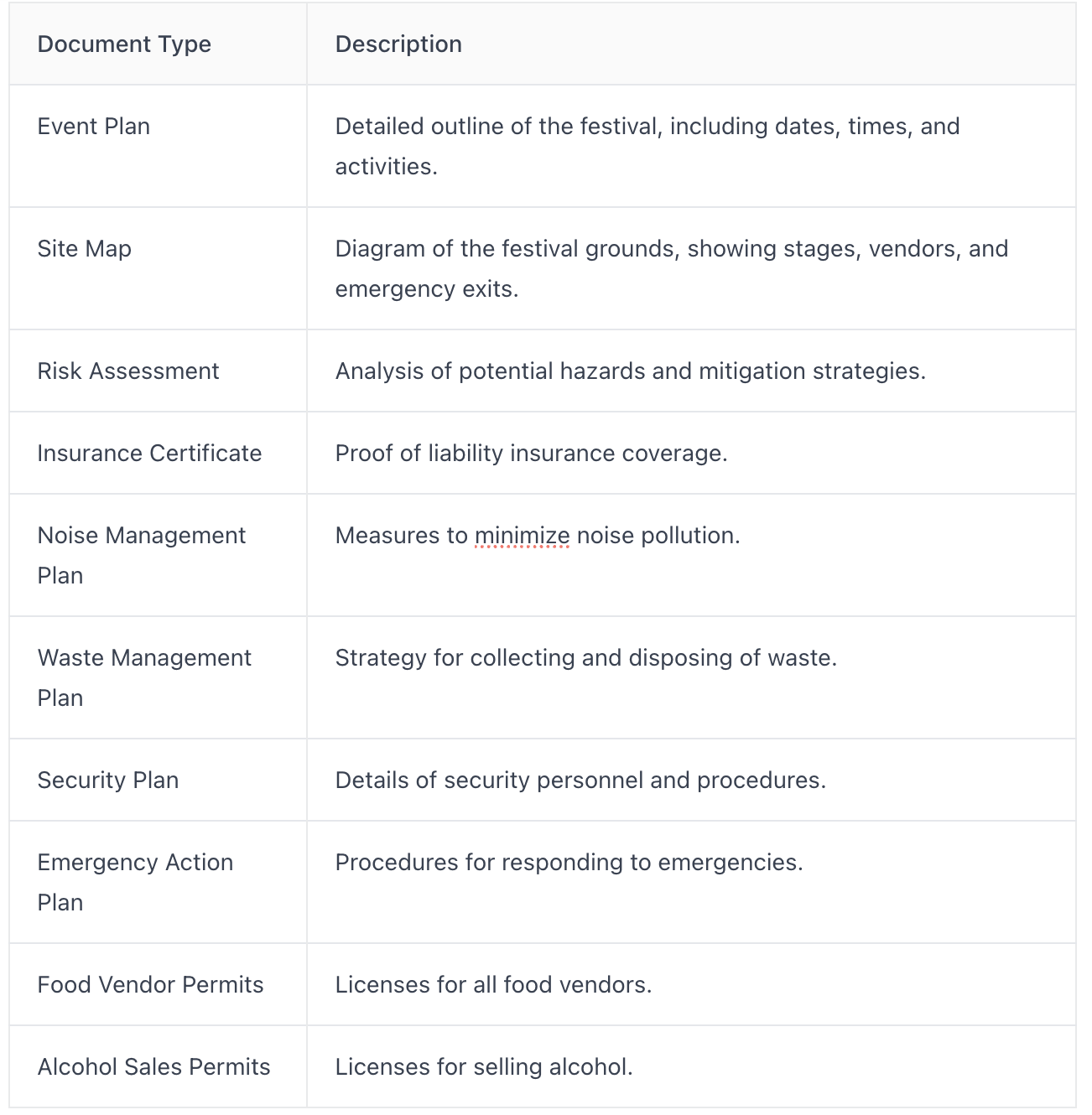Register as an organizer
Click the button below and finish your organizer registration, or fill out the form and we will be in touch to assist you.
.jpeg)
Planning a festival anywhere can be a real headache, but when you're looking to host one across different countries in the EU, it's a whole new level of complicated. You've got to deal with all sorts of rules and paperwork, from getting the right permits to making sure everyone involved can actually come into the country. It's a lot to keep track of, but don't worry, we're here to break down the festival permit application process so it feels a lot less overwhelming. Let's get into it.
Okay, so you want to throw a festival in the EU? Awesome! But first, you gotta wrap your head around the maze of EU regulations. It's not as simple as just picking a field and setting up a stage. The EU has rules about everything from noise levels to waste disposal, and they all impact your permit application. Think of it like this: you're not just planning a party; you're running a small city for a weekend. You need to know the rules of the road, or you'll end up with a hefty fine – or worse, the whole thing gets shut down.
It's easy to get lost in the details, but remember the big picture: these regulations are in place to protect people and the environment. If you approach the process with that mindset, it'll be a lot less stressful.
Planning a festival that spans multiple EU countries? Now you're talking next-level complexity. Each country has its own spin on the rules, so you can't just assume what works in Germany will fly in France. Cross-border festivals need to meet the requirements of every jurisdiction involved. This means more paperwork, more inspections, and more potential headaches. But don't freak out! With careful planning and a good lawyer, it's totally doable.
Let's be real: nobody loves paperwork. But when it comes to festival permits, getting your documents in order is half the battle. The more organized you are, the smoother the application process will be. Think of your application as a story you're telling the authorities. You want it to be clear, concise, and convincing. Don't leave anything to chance, and don't assume they'll know what you're talking about. Spell it all out, and back it up with solid evidence.
Here's a quick look at some common documents you might need:

Even if you've got your international performers sorted, you're not in the clear until you've tackled the local side of things. Local permits and licenses are the bedrock of any festival. They're what give you the green light to actually hold the event in a specific place. The process can be super simple in some areas, but a total headache in others. You might need a bunch of different approvals, and missing just one can throw a wrench in the whole operation.
First up, you'll likely need a general event permit. This usually means handing over a detailed plan that covers everything: where the festival is, when it's happening, how many people you expect, the layout, and all the safety stuff. Getting the thumbs-up might involve dealing with city hall or some other local group. If you're using a venue that already exists, like a stadium, make sure you've got the owner's permission and that the local authorities are okay with the number of people you're planning to squeeze in. If it's an open field or public land, you might need a land-use permit or a rental agreement with the government. Sometimes, public parks even need their own separate permits and the blessing of the local community board.
If you're building stages, setting up lighting, or putting up any kind of structure, you've got to play by the local building codes. You'll probably need temporary structure permits or engineering certifications to prove that your stages, tents, and viewing platforms are safe. The fire department will also want to sign off on your layouts, exits, and fire prevention measures. It's all about making sure everything is up to snuff and won't collapse or go up in flames.
Festivals with food vendors, booze, or camping need to jump through a whole other set of hoops. Serving alcohol usually means getting a temporary liquor license, which comes with rules about checking IDs and keeping things under control. Food vendors need health department permits, and the rules about food handling and water supply can be really strict, depending on the country. If your festival lasts for days and people are camping on-site, you'll also have to meet sanitation requirements for restrooms and waste disposal. It's a lot to keep track of, but it's all about keeping everyone healthy and happy.
Getting all these permits can take months, so start early. Meet with local officials to understand what's needed. Having someone on the ground who speaks the language and knows the local scene can be a lifesaver. They can attend meetings and handle the paperwork, making sure you don't miss any deadlines or get lost in translation.

It's easy to get caught up in the excitement of planning a festival, especially when you're bringing it to a new country. But, you absolutely must pay attention to local laws and regulations. Ignoring these rules can lead to serious problems, including fines, permit denials, or even having your event shut down. It's not just about getting the main permits; there's a whole web of local rules you need to understand.
Public safety is always a top priority, and local authorities will have specific requirements for how you manage your crowd. This isn't just about hiring enough security guards. You might need to:
These rules can vary a lot from place to place, so don't assume what worked in one country will work in another.
Nobody wants to be that festival that keeps the whole neighborhood up all night. Most places have noise ordinances and curfew laws that you need to follow. Getting a noise permit usually involves:
It's a good idea to talk to local residents and businesses early on. Addressing their concerns about noise can go a long way in getting your permit approved. Plus, it's just good community relations.
Hope for the best, but plan for the worst. You'll need to show that you have adequate emergency services in place, including medical personnel, fire safety measures, and evacuation plans. You'll also likely need to have insurance coverage that meets local requirements. This might include:
Make sure your insurance policy covers everything it needs to, and that you have enough coverage to protect yourself from potential liabilities.
Getting international performers to your festival can be tricky, but it's a huge part of what makes many events special. It's not just about the headliners; it's about their crews, too. Understanding the rules and planning ahead is key to avoiding major headaches.
Some festivals get a special designation that makes it easier for international artists to perform. This is often called a Permit Free Festival List, and it can significantly reduce the immigration paperwork. These lists, like the one in the Immigration Rules, are usually maintained by government agencies and updated regularly. If your festival is on the list, it means artists from certain countries can perform without needing a full work permit, which saves time and money. It's worth checking if your festival qualifies or if there are ways to get it added to such a list.
Not every festival can get on the Permit Free Festival List. There are usually specific requirements that need to be met. These can include:
It's important to research the specific criteria for the countries where your festival operates. Sometimes, working with a local partner or promoter can help you meet these requirements. Also, remember that even if a festival is on the list, individual performers may still need to meet certain eligibility criteria, such as having a valid passport and no prior immigration violations.
Being on a Permit Free Festival List has big advantages for both the artists and the festival organizers. For artists, it means less paperwork and a faster visa process. This makes it easier for them to accept invitations to perform, especially if they have multiple gigs lined up. For organizers, it means less administrative burden and a wider pool of talent to choose from. It can also improve the festival's reputation and attract more attendees. Plus, it reduces the risk of last-minute visa denials, which can be a logistical nightmare. It's a win-win situation that helps promote cultural exchange and makes the festival scene more vibrant.
Planning for international performers involves more than just booking flights. It requires a solid understanding of immigration laws, careful documentation, and proactive communication with artists and government agencies. By taking the time to do it right, you can ensure that your festival is a success and that your performers have a positive experience.
When you're trying to get a festival permit, you can't just say you're going to have a great event. You need to prove it. Showing that your festival has a solid track record is key. This means providing evidence of past events, including how long the festival has been running and how many people attended. Think of it like building trust with the authorities – they want to see you're not just some fly-by-night operation.
For certain permits, especially those related to the UK's Permit Free Festival list, you'll need to show that you're bringing in international talent. This isn't just about having any performers; it's about having a specific number of non-British or Irish acts. It's a way to ensure the festival has a diverse and international flavor. The number of non-British or Irish performers is important.
Getting a festival permit isn't just about filling out a form; it's about backing up your application with solid evidence. Think of it as building a case – you need to provide all the necessary documents to convince the authorities that your festival meets all the requirements. Missing documents can cause delays or even rejection, so it's important to be thorough.
It's always a good idea to start gathering these documents well in advance of the application deadline. The more prepared you are, the smoother the process will be. Don't wait until the last minute to scramble for information – it'll only add stress and increase the chances of making mistakes.

Getting your permits in order for a festival isn't something you can just throw together at the last minute. It demands careful planning and a realistic timeline. Start by working backwards from your festival date, marking down every key deadline. Think about when you need to submit each application, allowing extra time for potential delays. For instance, if a permit usually takes a month, plan for two. This way, you're not scrambling if something unexpected pops up. Consider using tools like Gantt charts to visualize the entire process and keep everything on track.
Don't wait until the last minute to start talking to local authorities. Early engagement is key. Meet with them as soon as you have a location in mind. This helps you understand exactly what's required and avoid surprises later on. It's also a good idea to maintain regular contact with any assigned liaisons, showing respect for local protocols. This can turn them into partners who can help you navigate the process more efficiently. Pre-submission meetings offer a vital opportunity to discuss and clarify regulatory and scientific aspects.
One of the smartest things you can do is bring in local expertise. Hire local staff, volunteers, or even a consultant who knows the ins and outs of the local regulations. They can spot potential issues that a foreign team might miss and help bridge any language gaps. Plus, having locals on your team shows your commitment to the community, which can be a big boost when dealing with officials.
Integrating local knowledge into your planning can be the difference between a smooth process and a major headache. It's about learning from those who know the area best and building relationships with the community.
Here's a simple breakdown of why local expertise matters:
So, that's the deal with festival permits in the EU. It's not always a walk in the park, but it's definitely doable. The main thing is to start early, do your homework, and don't be afraid to ask for help. Every country, and even every city, might have its own little quirks, so staying on top of the details is super important. Getting these permits sorted out smoothly means less stress for everyone and, more importantly, a great time for all the festival-goers. Here's to making awesome events happen across Europe!
The Permit Free Festival List helps international artists perform in the UK more easily. It means they can often use a simpler 'Standard Visitor Visa' instead of needing a special work permit. This saves festival organizers time and money because they don't have to get a sponsor license for the artists.
To get on the list, a festival must have been around for at least three years, had at least 15,000 attendees for its last three events, and expects the same number for the next one. Also, at least 15 non-British or Irish performers must have played at each of the last three festivals, and the same number should be invited for the upcoming event.
Yes, if a festival is on the Permit Free Festival List, performers can get paid for their shows. This makes it much easier for them to come to the UK and perform.
The application period for the Permit Free Festival List usually opens late in the year and closes at the end of January the following year. Once a festival is on the list, it usually stays on it for future years without needing to reapply every time.
You'll need to provide copies of past festival programs, a letter from an organization like the Arts Council if they support your event, news clippings about the festival, proof of ticket sales and attendance, and details about non-British or Irish performers from the last three years and those invited for the next event. The government might ask for more documents if needed.
Yes, performers can play at more than one permit-free festival during a single trip to the UK, as long as their total stay doesn't go over six months. If some events aren't on the list, it's a good idea to get legal advice to make sure everything is compliant for their whole tour.
More blogs
Click the button below and finish your organizer registration, or fill out the form and we will be in touch to assist you.